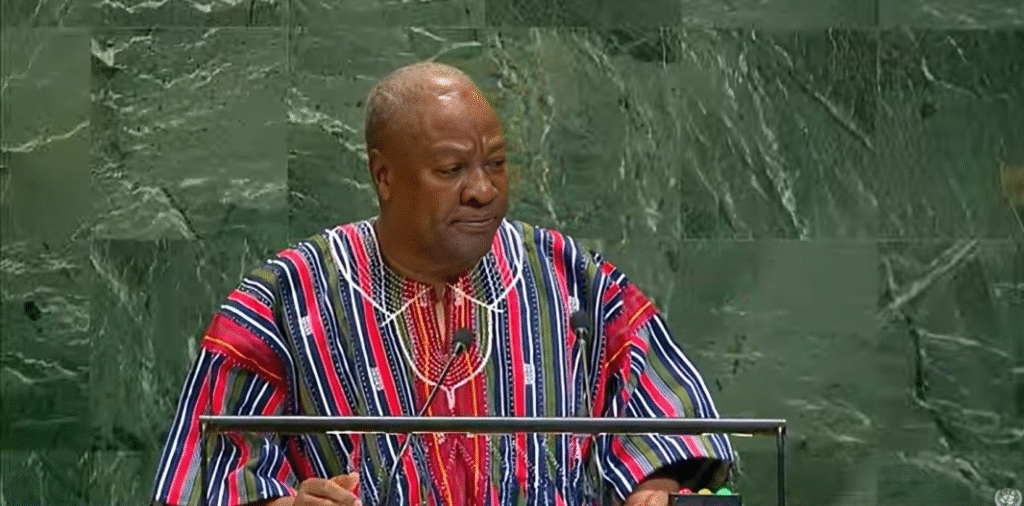– Demands Permanent Seat, Billions in Reparations
BY PRINCE AHENKORAH
President John Dramani Mahama dropped a political atomic bomb on the global elite yesterday, launching a blistering, no-holds-barred call for a total ‘Reset’ of the United Nations and the entire post-war world order.
Addressing the 80th session of the UN General Assembly, a visibly impassioned Mahama demanded immediate, structural reforms to confront historical injustices, a rigged global financial system, and the sheer audacity of colonial-era exclusion.
His message was clear: Africa’s time is now, and its massive demographic and economic muscle can no longer be ignored—or silenced—in international governance.
The African Seat and the Veto Power
Mahama’s most forceful demand was for a permanent African seat on the powerful UN Security Council, complete with the coveted power of veto.
Citing the fact that only four African nations were among the UN’s 51 founding members in 1945—an exclusion rooted in the infamous 1884 Berlin Conference that partitioned the continent—Mahama thundered that the world of today is unrecognizable from 1945.
“The most powerful post-World War II nations are still being rewarded with an almost totalitarian guardianship over the rest of the world,” he declared, slamming the logic of a select five countries wielding absolute veto power to block collective action.
He quoted Nelson Mandela’s 1995 request for the same seat, then pointedly asked, “Thirty years later, we African leaders are still making the same request… if not now, then when?”
The President backed his argument with UN projections: by 2050, Africa will account for more than 25% of the world’s population and a full one-third of all young people aged 15 to 24. “The future is African,” he stated emphatically.
Reparations: The Greatest Crime
In a potentially game-changing move, Mahama announced Ghana’s intention to introduce a motion at the UN demanding reparations for slavery and colonial exploitation.
Framing the transatlantic slave trade as the “greatest crime against humanity,” he spotlighted that over 12.5 million Africans were forcibly transported, enriching Western powers at the expense of African development.
“We must demand reparations for the enslavement of our people and the colonization of our land that resulted in the theft of natural resources, as well as the looting of artifacts and other items of cultural heritage,” Mahama insisted.
He condemned the “hypocrisy” of governments that compensated slave owners for ‘property’ loss after abolition, yet offered nothing to the enslaved themselves.
Ghana’s Economic Miracle: The Domestic Reset
Mahama also used the world stage to champion Ghana’s own stunning economic recovery under his second, non-consecutive term, which began in January 2025. Facing a crippling debt burden and high inflation, his government launched its domestic “Reset Agenda.”
The numbers are clear: inflation has plummeted from 23.8% in December 2024 to 11.5% by August 2025. Critically, the Ghanaian Cedi had a moment in the sun, surging to become the world’s best-performing currency according to Bloomberg, with investor confidence rebounding and sovereign credit ratings improving.
Mahama argued that Ghana’s success story should inspire the UN to undertake its own long-overdue reset.
Global Conflicts and Migration
The Ghanaian President did not shy away from current global hotspots. He gave a stark warning on the situation in Gaza: “If it looks like a duck, swims like a duck, and quacks like a duck, well then… it must be a duck. The crimes in Gaza must stop.”
He also drew global attention to Sudan, which he called the world’s largest humanitarian crisis with 12 million displaced people, urging the international community to show the same compassion it displayed for Ukrainian refugees.
Finally, addressing rising xenophobia, Mahama reminded delegates that many migrants are actually climate refugees, driven from their homes by crises caused largely by greenhouse gas emissions from the Global North.
“We are tired of people extracting the most they can from us and, in return, offering us the very least by way of respect, consideration, and dignity,” he declared, demanding African nations assert sovereignty over their own natural resources.
The question now remains: Will the powerful nations heed Mahama’s fierce call for a reset, or will Africa’s demands for a seat at the table continue to be sidelined?


